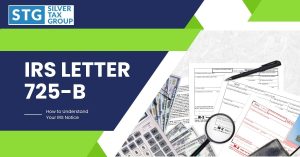Failing to file your annual tax return could result in penalties, fees, legal action, and other negative consequences. It’s always best to file your return by the deadline and pay taxes on time each year.
The IRS, however, may decide to file a substitute for return (SFR) if you fail to file when you’re supposed to and fail to communicate a reasonable cause for not filing. The agency completes an SFR based on the information your employers or financial institutions sent them. This may include income reporting tax documents like W-2s, for example, that outline what you made from a given job.
The IRS may file SFRs for up to six years in the past Usually these actions are taken within three years following the delinquent return’s original deadline. A substitute for return will not account for any credits and deductions you’re eligible for, so it’s not the same as filing a return yourself. This guide will walk you through why an SFR can create complications and risks for you and how to avoid or resolve them.

Downsides of a Substitute for Return
An SFR is not just a free pass that the IRS gives you should you fail to file your return by the tax deadline. You will still be charged late fees and other penalties, and your tax return will not always accurately reflect your situation if you have expenses or credits you need to report. Here are additional downsides of the IRS filing an SFR, including:
No Credits, Exemptions, or Deductions
Your filing status on an SFR will be either single or married filing separately, so you will miss out on credits you could be eligible for otherwise. This is especially crucial for self-employed individuals, who lessen their tax burden significantly by reporting business expenses and other deductions.
More Scrutiny from the IRS
The IRS will likely assess SFRs in more detail than a regularly filed return that was submitted on time. This means they will be more scrutinizing, looking for mistakes or inconsistencies that could lead to other issues. This process is automated, so there is more room for potential errors. You are still responsible for everything included in the return should a problem arise.
You Still May Have to File
You will probably still need to file a tax return after the IRS has filed a substitute for return on your behalf so you can take advantage of your deductions that they didn’t include. This wastes a lot of time when you could have just filed it correctly in the first place.
Penalties and Fees
Not filing your tax return on time will still result in penalties that you are responsible for paying. For example, you will be charged failure-to-file and failure-to-pay penalties if tax was due and unless you qualify for a reasonable cause for not filing, such as a serious illness or natural disaster.
The SFR may be a return that the IRS files for you, but it doesn’t mean that you are off the hook for your tax obligations. It is always best to discuss your situation with a tax expert if you have failed to file on time.

5 Ways to Avoid or Resolve a Substitute for Return
There are several ways to avoid an SFR from the IRS or to resolve the issue if they have already filed one. Start with these steps:
1. File Your Tax Return by the Deadline
The best and most effective way to avoid an SFR is to file your tax return by the deadline and pay any taxes you owe. This way, you will never miss out on any exemptions, credits, or deductions you’re eligible for, and you will not have to pay late-filing penalties.
2. File a Delinquent Return
Consider filing a delinquent tax return if the IRS has filed an SFR so you can still report your credits and deductions. You may still be able to receive a refund. Note that you have three years from the original filing deadline to do so.
3. Contest the Amount
The audit reconsideration process allows you to contest the amount due under the SFR. You will need to file your delinquent return in this process as well. Note that the IRS still may not approve your claim, and you will still be responsible for paying the amount due.
4. Respond to Initial IRS Notices
The IRS will send you notices once they see that you have not filed a tax return for a given year, and they do this before they file an SFR. Avoid this and subsequent consequences by responding to these notices within 30 days. Failing to answer them will lead to a statute notice of deficiency or a “90-day letter,” which is how the IRS legally determines a tax deficiency.
5. Communicate Special Considerations
You can also respond to notices with a reasonable cause or special consideration for not filing your taxes that the IRS should consider. You cannot simply fail to communicate your reasonable cause to the IRS and expect them to know without facing penalties.
These matters can be complex and confusing, especially if you are dealing with a special circumstance or didn’t know that you missed a return. It is always best to file and pay by the annual tax deadlines to avoid legal action or steep penalties, but if you made a mistake, talk to a tax attorney who can help you untangle your tax issue.

Contact a Tax Expert with Questions about Substitute for Returns
The experienced team at Silver Tax Group is here to help you with any tax-related issues you may be facing. This includes SFRs, IRS notices, delinquent tax returns, tax audits, and many other situations. You never want to take a wrong step or fail to respond to the IRS in a timely manner when something goes wrong, but before you do, a tax attorney can help you know exactly how to proceed.
Reach out to Silver Tax Group to speak to a tax expert about SFRs or delinquent tax returns.








